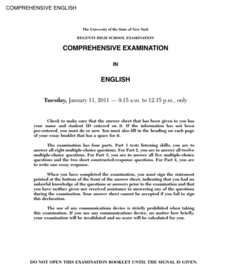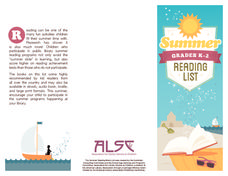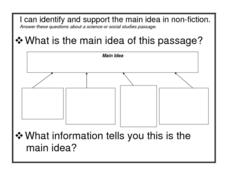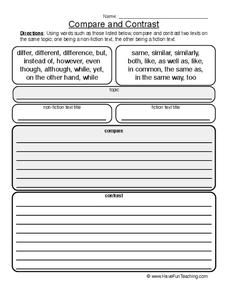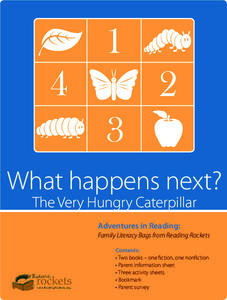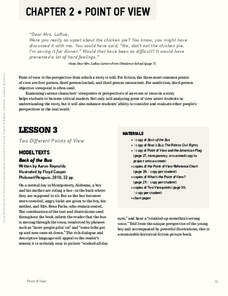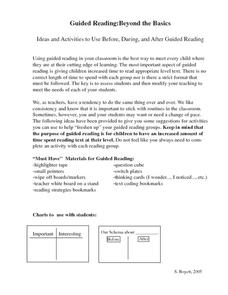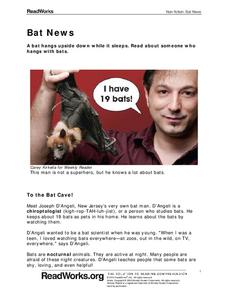EngageNY
Analyzing the Significance of the Novel’s Title: Connecting the Universal Refugee Experience to Inside Out and Back Again, Part 2
How does poetry help people better understand societal issues? Pupils participate in a jigsaw activity to analyze poems from the novel Inside Out & Back Again. Next, they connect the poems to real-life refugee experiences from the...
Curated OER
Reading Comprehension: Guinness Book of World Records
If your learners are curious about human achievement, superlatives, or esoteric trivia, the Guinness Book of Records is a way to tap into instrinsic motivation and relevance. Here's an informational reading that will grab their attention...
Fun in First
Help Your Child Become a Better Reader
Ensure that your learners can read both fiction and nonfiction texts with ease! This resource includes questions that individuals can ask themselves while reading either type of text to help learners comprehend the text, make...
New York State Education Department
Comprehensive English Examination: January 2011
Scholars read an excerpt from the short story "The Bonfire" by Kunikida Doppo as well as a nonfiction passage about handcycling. Next, they answer comprehension-based multiple-choice questions. Additionally, they respond to short-answer...
Association for Library Service to Children
Summer Reading List Grades K-2
Keep your kids reading throughout the summer with a wonderful list of books! Youngsters can choose from 25 different titles, each of which is paired with publication information so that their parents, guardians, or librarians can easily...
Association for Library Service to Children
Summer Reading List Grades 6-8
What better activity is there for summer than reading? Provide your pupils with 25 book ideas for their summer reading pursuits. A variety of different genres are represented on this list, and each book is paired with publication...
Polk Bros Foundation
I Can Identify and Support the Main Idea in Non-Ficiton
Analyze a historical or scientific informational text by determining the main idea and supporting details. This graphic organizer allows pupils to write down the main idea and four details.
Have Fun Teaching
Compare and Contrast (3)
Sometimes the way a topic is presented in fiction can be very different from how it is in reality. Compare and contrast a topic from both a fiction and nonfiction source with a graphic organizer that prepares kids to write about what...
Curated OER
Nonfiction Genre Mini-Unit: Persuasive Writing
Should primary graders have their own computers? Should animals be kept in captivity? Young writers learn how to develop and support a claim in this short unit on persuasive writing.
Polk Bros Foundation
Meet the Nonfiction Main Idea Challenge
Help your class develop the ability to determine a main idea with a packet of materials that you can introduce and use over a period of time. The packet includes some information for the teacher and rationale for the exercises. There are...
Polk Bros Foundation
A Way to Analyze Paragraphs to Figure Out the Main Idea of a Nonfiction Text
Shrink up a section by asking pupils to write down the main idea for each of seven paragraphs. There is a space provided for each main idea. When students have completed this portion, they write down what they think to be the central...
Polk Bros Foundation
I Can Identify a Nonfiction Writer's Main Idea and Supporting Examples
Use this page to quickly identify the central idea of a text and organize ideas for writing an informational or explanatory text. The worksheet is split into two parts. In the first part, pupils note down the main idea and supporting...
PBS
Reading Adventure Pack: Money
Money is the topic of a reading adventure pack. Third graders read two books—one fiction, one non-fiction—and complete a series of activities. Learners draw an item they wish to save money for, examine coins to start a collection, and...
Baruch College Writing Center
Summarizing, Paraphrasing, and Quoting Workshop
What's the difference between summarizing and paraphrasing? Show class members how to find the main ideas from informational text and condense it, restate it, or quote it directly with a series of educational activities based on two...
PBS
Reading Adventure Pack: What's Next? The Very Hungry Caterpillar
A series of hands-on activities follows a reading of The Very Hungry Caterpillar by Eric Carle. Learners create a paper collage to explore the beginning, middle, and end of days of the week, numbers, and more. They grow a butterfly...
Syracuse City School District
Summary of Fiction and Non-Fiction Text
Somebody Wanted But So Then (SWBST)? Yes! Here's a great strategy for teaching young readers how to summarize narrative text. In addition, the packet includes exercises that show kids how to summarize nonfiction text using the classic...
Scholastic
Comprehension During Independent Reading
Ideal for a language arts class, literary unit, or independent reading assignment, a set of reading worksheets address a wide array of skills. From poetic elements to nonfiction text features, you can surely find a valuable resource in...
PBS
Reading Adventure Pack: Rocks
A Reading Adventure Pack focuses on rocks. Scholars participate in three activities after reading a fiction and nonfiction text—The Jade Stone, a Chinese folktale adapted by Caryn Yacowitz, and Rocks in His Head by Carol Otis Hurst....
Scholastic
Point of View
The point of view in a story can dramatically change the story itself. Focus on finding the points of view in various reading passages with a language arts packet, which includes fiction and nonfiction text.
Ideas From Suzi
Guided Reading: Beyond the Basics
Elevate children's reading comprehension skills with this collection of guided reading resources. From paper dice with basic comprehension questions printed on them to a system for using sticky notes to identify key parts of a story,...
K12 Reader
Uncle Tom’s Cabin: George’s Speech
Sometimes it takes a work of fiction to demonstrate nonfictional tragedies and events. George, an escaped slave, describes to Mr. Wilson the hardships of his life in a short passage from Harriet Beecher Stowe's novel, Uncle Tom's Cabin.
Read Works
Bat News
Get the bat facts with a short nonfiction reading passage. After reading the passage, readers respond to questions that focus on main idea, inferencing, vocabulary in context, and author's purpose.
Houghton Mifflin Harcourt
One Land, Many Trails: Challenge Activities (Theme 5)
Bring history to life through literature. The first in a series of three challenge activities designed to accompany Theme 5: One Land, Many Trails does just that through unique projects connected to historical fiction and nonfiction...
New York State Education Department
English Language Arts Examination: June 2018
Is graffiti art? Writers explore that question as part of a source-based argument within a set of questions from the NY Regents examination. The assessment from June 2018, part of a larger set of standardized tests, consists of three...
Other popular searches
- Nonfiction Book Reports
- Nonfiction Text
- Summarizing Nonfiction
- Fiction and Nonfiction
- Fiction or Nonfiction
- Nonfiction Reading
- Nonfiction Text Features
- Nonfiction Text Structure
- Nonfiction Books
- Nonfiction Reading Skills
- Nonfiction Writing
- Nonfiction Literature





